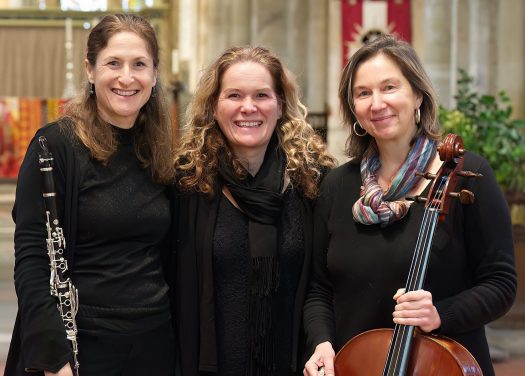 United Kingdom Verne-Bredt, Tate, Beethoven, C. Schumann: Mayflower Ensemble (Nicola Heinrich [cello], Alison Hughes [clarinet], Samantha Carrasco [piano]). Beaulieu Abbey Church, Brockenhurst, 16.3.2024. (CK)
United Kingdom Verne-Bredt, Tate, Beethoven, C. Schumann: Mayflower Ensemble (Nicola Heinrich [cello], Alison Hughes [clarinet], Samantha Carrasco [piano]). Beaulieu Abbey Church, Brockenhurst, 16.3.2024. (CK)

Alice Verne-Bredt – Phantasie Trio
Phyllis Tate – Sonata for Cello and Clarinet
Beethoven – Piano Trio, Op.11
Clara Schumann – Piano Trio, Op.17
Just a month ago I was in Hawksmoor’s impressive Church of St. Alfege in Greenwich, where the St. Paul’s Sinfonia give a season of concerts under their dynamic conductor Andrew Morley. The concert was book-ended by winning performances of Haydn’s 24th Symphony and Schumann’s First Symphony (‘Spring’), both given with infectious verve. Between them came two absolute gems: Alice Mary Smith’s Andante for Clarinet and Orchestra and the first performance of Ed Hughes’s Clarinet Concerto ‘Sky Blue’, inspired by Kandinsky’s painting of that name. The music had all the buoyancy, complexity and free-floating joy of Kandinsky’s images, and it was given an impressively assured performance by Ed’s sister Alison, clarinettist of the Mayflower Ensemble (a family affair: the work is dedicated to their mother on her 80th birthday).
If you haven’t come across Ed’s music (he is Professor of Composition at the University of Sussex) I can do no better than echo Richard Hanlon’s description: ‘enchanting…elaborate and strange, but incontrovertibly English’. Ed wouldn’t thank me for this incongruous comparison, but the Clarinet Concerto conjures, by more complex means, the kind of exhilaration you find in Michael Nyman’s Where the Bee Dances for soprano saxophone and small orchestra; and it made me want to hear these musicians play Finzi’s Clarinet Concerto (which, heretically, I would rather hear than Mozart’s).
I hope nobody minds my slipping in the above mini-review before turning to this concert given by the Mayflower Ensemble, who I have reviewed before (here). Here Alison Hughes and her colleagues Nicola Heinrich and Samantha Carrasco were playing in the wonderful space (and lovely acoustic) of Beaulieu Abbey Church, originally part of a Cistercian foundation. What I particularly appreciate about their work is their commitment to researching and performing the music of women composers – often valued by their contemporaries as performers but ignored as creators.
One such is Alice Verne-Bredt, whom Alison has been particularly dedicated to researching and bringing to performance. She was one of three sisters from Southampton, all famous in their day as pianists and teachers (Mathilde was a student of Clara Schumann; Adela gave the BBC Proms premieres of both Brahms piano concertos under Sir Henry Wood). The Phantasie Trio is one of the few pieces by Verne-Bredt to be published. Its subtitle ominously inverts a common consolatory idea: ‘Under the light there is darkness’. Its ten minutes or so begin with the dark sonorities of cello and lower piano in troubled minor mode; when the clarinet articulates the theme the effect is striking, like anguished speech. The cello launches the upward-yearning second theme, romantic and rather sultry; but the music never manages to shake off its unquiet character, so that the moments of genuine beauty sound wistful rather than affirmative. Faster, more animated music has us wondering whether we are striving towards the light, but it sinks down until all that is left is two deep, tolling notes on the piano.
It is a fine piece, deserving to be better known. It was followed by a little gem: the second movement (Vivo) from Phyllis Tate’s Sonata for Cello and Clarinet, first performed in 1947. In perfect contrast to the Verne-Bredt piece it is quirky and playful, requiring agility from both performers: it put me in mind of music for an early cartoon film. This is not to demean it – far from it (it is worth remembering that John Adams cites Schoenberg’s Chamber Symphony No.1 and Bugs Bunny cartoons as the joint inspiration for his own Chamber Symphony). I loved the wheezy cello arguing with the snappy clarinet; and the cello attempting a waltz before the music ran down like a clock. Music of personality and wit, and a tantalising trailer for the complete sonata.
Beethoven’s early Piano Trio is unusual in featuring a clarinet (he published an alternative version in which a violin replaces it), and also in its three-movement form. It is a delightful piece, elegant and full of freshness and charm, with fine, flourishing work for all three players: I particularly enjoyed the clarinet’s creamy legato in the Adagio, and the sheer inventiveness of the variations in the finale. The players’ involvement in and enjoyment of the music was palpable throughout.
The same was true of their performance of Clara Schumann’s Piano Trio in G minor (the violin part transcribed by Alison for clarinet). It opens enchantingly, as if we are eavesdropping on a conversation between friends: and the sense of her husband Robert’s untrammelled Romantic Fantasie in C behind the music’s lyrical ardour several times brought the pricking of tears. In the Scherzo the lilting theme with its gentle Scotch snaps sounded so lovely on the clarinet that I think I will miss it when I hear it played on the violin: and the same is true of the melody of the Andante – appropriately dubbed a ‘Song without Words’ in the programme note – when the clarinet takes it over from the piano. When the cello takes the melody, after a more animated central section, the effect is like balm, as is the ending of the movement over gently rocking chords on the piano. The finale draws us in with a magical once-upon-a-time melody and gives it exciting fugal treatment on the way to a stirring major-key ending.
The performance had all the warmth and commitment that the Mayflower Ensemble bring to everything they play; and in their championing of women composers they are doing something important and revealing. They deserve a wide following.
Chris Kettle
